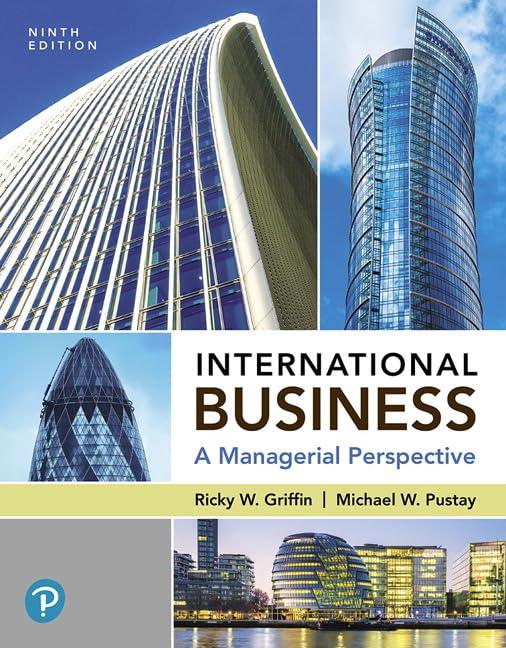Between the years 1979 and 1981 Saudi Arabia had a major disagreement with the other members of
Question:
Between the years 1979 and 1981 Saudi Arabia had a major disagreement with the other members of the Organization of Petroleum Exporting Countries (OPEC) about the appropriate price to charge for a barrel of crude oil. So-called OPEC hawks wanted to keep the price of oil high. Saudi Arabia, fearful that high prices would encourage other countries to explore for new, low-cost oil fields and stimulate consumers to conserve on energy usage, believed the most profitable long-run strategy was to keep prices low. The Saudis’s actions resulted in the creation of the “Aramco advantage,” and the world’s largest tax refund involving transfer pricing.
Aramco was a consortium of four U.S. oil companies— Chevron, Exxon, Mobil, and Texaco—that originally controlled the Saudi oil fields. (Exxon and Mobil have subsequently merged, as have Chevron and Texaco.) After its oil reserves were expropriated by the Saudi government in the 1970s, Aramco continued to play a major role in marketing Saudi oil. The Aramco advantage began in January 1979 when Ahmed Zaki Yamani, the Saudi oil minister, wrote a letter to Aramco forbidding it to sell Saudi oil for more than the price set by Yamani’s ministry. This price was well below the world market price for crude oil. The Aramco partners, not wishing to displease the Saudi government, dutifully complied with Yamani’s request. They sold the crude oil to their foreign refineries at Yamani’s price and then refined the oil into gasoline, diesel fuel, and other petroleum products. Yamani’s directive, however, covered only the price of crude oil. Each company was free to sell the refined products at their market prices, which the four companies did. Because they were buying the crude oil at less than the market price, the refining operations of the Aramco partners were soon making money hand over fist. (In case you are wondering, Yamani was not ignorant of the impact of his letter. He had numerous political reasons for his actions.)
The impact of the Aramco advantage was enormous. Exxon’s refineries earned an additional \($4.5\) billion from 1979 to 1981, and Texaco’s refineries netted an estimated \($1.8\) billion. Because these profits were earned by the companies’ foreign refinery subsidiaries, the profits could be sheltered from U.S. taxation thanks to the deferral rule—or so the companies thought. The U.S. Internal Revenue Service (IRS) had a different view, arguing that it was the marketing activities of the two companies that were responsible for the profits, not the refining operations. Accordingly, the IRS claimed that \($4.5\) billion in income should be transferred to Exxon (the parent corporation) from its foreign refineries and that Texaco should make a similar shift of \($1.8\) billion. Having done so, the companies then should be required to pay U.S. corporate income taxes on these earnings.
Not surprisingly, the companies resisted the IRS’s interpretation. They said they were following the explicit instructions of the minister of a sovereign, friendly nation. Because of Yamani’s directive, Texaco and Exxon asserted that the parent companies were unable to directly benefit from lower crude oil prices because the companies were forbidden to resell the oil at the market price. Rather, they noted that the Aramco advantage could be captured only by someone operating further down in the production-distribution chain. As things turned out, it was the next link in the chain—the foreign refineries owned by the individual Aramco partners—that garnered the Aramco advantage. Exxon and Texaco also pointed out that the United States had been putting great diplomatic pressure on the Saudis to lower the price of crude oil and that U.S.
officials understood the result of this policy would be increased refining profits......
Case Questions
1. Which unit of Texaco really “earned” the Aramco advantage? Aramco itself?
Texaco’s foreign refineries? Texaco’s marketing operations? Or the parent corporation?
2. Had Aramco sold the crude oil to Texaco’s U.S. refineries, would Texaco have been able to avoid U.S. taxation on the Aramco advantage?
3. Because Minister Yamani created the Aramco advantage partly in response to U.S.
diplomatic pressure, should Exxon and Texaco have been required to sell their allotment of Saudi crude oil to their domestic refineries?
4. The IRS lawyers argued that the appeals court ruling amounted to a “blueprint for the evasion of U.S. taxes. [It]…creates substantial tax incentives for United States corporations to encourage or to endure the adoption of profitable foreign ‘legal restrictions’ that ‘require’ such corporations to avoid United States taxation.” Do you agree with the IRS position? Or is it just being a crybaby because it lost?
Step by Step Answer:






